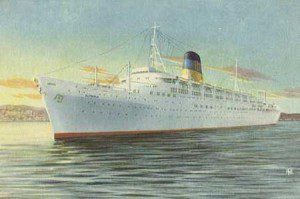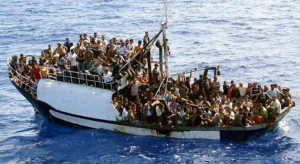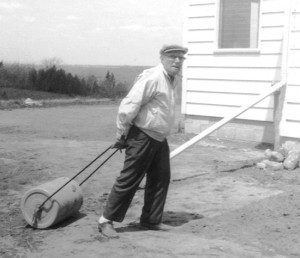
My sister and I made it our business to arrive in the theatre aboard the ship before most other passengers. We loved the idea – especially on rainy days during our Atlantic crossing – of getting the best seats from which to watch the Hollywood movie screened that afternoon, a new one every day.
But this day, when we got to the theatre, most seats were filled with other passengers. The Greek Line ship on which we were sailing – the Olympia, bound from Athens to New York City in the summer of 1964 – had recently stopped at Naples. A large number of Italian passengers – we sensed they were immigrants – had come aboard. Anyway, when my sister and I entered the theatre this day the woman in charge of ship orientation was scolding some noisy children among the immigrant passengers.
“Be quiet!” she scolded with a thick Greek accent. “If you do not behave, I will throw you away!”
Of course, she meant she would throw the children out of the theatre. We later learned the same orientation lady was also teaching the immigrants some English words; she doubled as a language instructor in the theatre. We happened to catch one of her lessons and discovered that her pronunciation skills were less than instructive. The word “fish” came out “fees” and “sugar” sounded like “sooker.” My parents, my sister and I couldn’t help imagining these unfortunate Italians en route to a new home in America would soon be asking for basic foods at the supermarket with pronunciations no one could understand.
We dubbed the orientation woman, “Miss-information.”

It’s a cliché perhaps, but in the current Middle East crisis – Syrian men, women and children fleeing civil war there – I think it’s instructive to remember (except for First Nations) we have all come to North America from somewhere else. It was once described as the settlement of the continent. I think more correctly – whether it was the exodus in the late 19th century, passage from a post-war Europe in the late ’40s, or such emergency migrations as the “boat people” from southeast Asia in the 1970s and the refugees from Kosovo in the 1990s – it should be described as waves of immigration. And we all have our family stories. We are all Syrians.

My grandfather and my namesake, Theodore Kontozoglus, came to North America under very similar circumstances. Oppressed by the armies of the Ottoman Empire, his family all tried desperately to flee from the coastal villages of what is now Turkey. He succeeded by assuming the identity of someone else to escape the military draft in Turkey. He worked hard to pay for passage from Piraeus, Greece, on a trans-Atlantic ship in 1912, and he arrived at Ellis Island, where U.S. immigration officials completed their interrogation of each person by marking in chalk either an “X” or an “O” on the immigrant’s back.
“I was scared they would send me back,” my grandfather told me. “But the ‘O’ on my back meant I passed.”
A generation later, my mother and father (Kay and Alex Barris) left those grandparents in New York behind, choosing to come to Canada. While I know they loved their American-family roots, I sensed, at least in my father’s case, that he wanted to write in a country more attracted to peacemaking than solving world issues by confrontation and war. His choice was prophetic. Within five years of the end of the Second World War, the U.S. became embroiled in the Korean War, and other conflicts in Southeast Asia. In fact, the residual benefit of my father’s immigration to Canada for me, when I was in my 20s, was that I did not end up being drafted into the U.S. military to fight in Vietnam.
“I think we’re agreed,” my dad used to tell me, “that you don’t look very becoming in a U.S. military uniform.”
All this to say, that most parents in most cultures seek a better future for their children. They try to find more comfortable accommodation, more nutritious food, more sophisticated education and better prospects for life fulfilment than they had themselves. On the receiving side of this latest rush of Syrian refugees, I think it’s vital for us to remember our own humble routes to Canada. I cringe when I hear Canadians say, “We should only accept the right immigrants.” Who knew that my grandfather, using a false identity to escape Europe, would become an upstanding U.S. citizen? Who knew that my father’s choice to leave America for a writing career here, would lead to his being awarded the Order of Canada?
If we all had the attitude, “If you do not behave, I will throw you away,” no immigrant would ever be trusted or accepted this side of the pond.